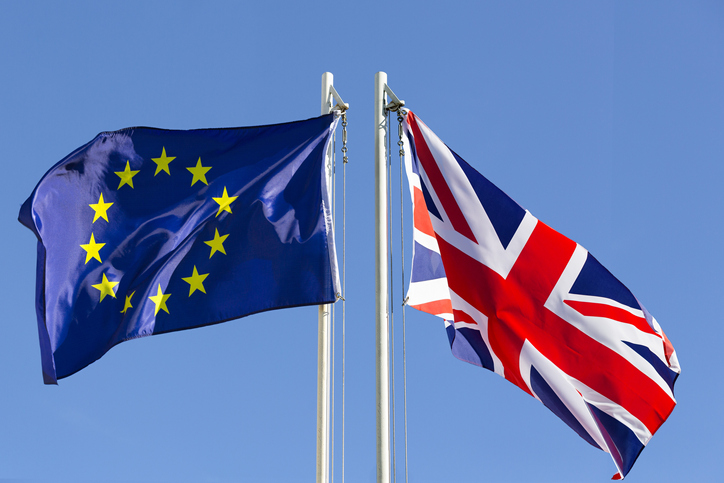An update on the relationship between the UK and EU in a post-Brexit world, as an eventful 2022 draws to a close.
Northern Ireland
The Northern Ireland Protocol Bill is set to enter the report stage in the House of Lords. At the committee stage, several members of the Lords raised concerns over clause 18 of the Bill, which permits ministers to “engage in conduct” in relation to matters dealt with in the Northern Ireland Protocol if the minister “considers it appropriate to do so”. This wide discretion granted to ministers has resulted in some of the Lords referring to clause 18 as the “do whatever you like” clause. The Northern Ireland Protocol Bill, and its anticipated impact on the Protocol, has proved to be a point of contention between the UK Government and the EU – you can read more about the effects of the Bill here.
Despite this, UK Prime Minister Rishi Sunak and President of the European Commission Ursula von der Leyen have vowed to “work together” to find a solution on the Northern Ireland Protocol. During a phone call on Thursday 22 December 2022, the pair discussed post-Brexit arrangements in Northern Ireland and the war in Ukraine. There are indications that the recently icy relationship between Westminster and Brussels may be set to thaw, although it remains to be seen how the impasse over Northern Ireland will be breached. The EU have remained, at least on the surface, stubbornly opposed to conceding any ground on the Protocol, while any compromise made by Sunak is likely to be met with criticism from the Conservative backbenches.
A glimmer of hope appeared on Monday 9 January 2023, with the British Foreign Secretary, James Cleverly, and European Commission Vice President Maroš Šefčovič meeting to discuss the Protocol. Following discussions, the pair announced agreement on EU access to UK IT systems recording the flow of goods from Northern Ireland to Great Britain. This positive development indicates that more progress may be made on the Protocol in the coming months. A follow-up meeting on Monday 16 January 2023, which some anticipated would result in a breakthrough on the Protocol, ultimately did not result in any substantive agreement, although the mood remains positive as the two sides continue to work towards a framework for an agreement for settlement.
Politically, Northern Ireland remains deadlocked, with the Democratic Unionist Party refusing to join in forming a new government, in protest of the Protocol. The Secretary of State for Northern Ireland, Chris Heaton-Harris, initially extended the deadline to form a new Assembly Executive to 8 December 2022, but this has now been further extended to 13 April 2023. The UK Government will therefore need to keep the demands of the DUP in mind when negotiating a compromise with the EU, as their refusal to accede to any such renegotiated form of the Protocol would necessitate new Northern Ireland Assembly Elections by 13 April 2023 – with no guarantee that the outcome of those elections will break the deadlock. Further, the minimum campaigning time is 6 weeks, meaning that any election would need to be called by 5 March at the latest; leaving just over a month for the UK and EU to reach a deal that the DUP deem acceptable. Mr Harris and Mr Cleverly travelled to Belfast on Wednesday 11 January to meet with political parties regarding “issues created by the Northern Ireland Protocol” – although Mary Lou McDonald, leader of Sinn Fein, was not invited to these talks.
Revocation of EU Law
We previously covered the introduction of the Retained EU Law (Revocation and Reform) Bill in the British House of Commons, which promises to repeal all retained EU law by 31 December 2023, unless specific legislation is introduced to keep such law in place. You can read about the Bill’s potentially dramatic impact on employment rights here.
Since our last update, the only amendments made to the Bill have been drafting changes introduced by the Government itself. Amendments tabled by the Opposition, to carving out employment rights and environmental protections, and require the Government to publish a complete list of the legislation that will be impacted by the Bill, were unsurprisingly defeated, given the current Conservative majority in the Commons. However, it is widely expected that the Bill will face greater opposition in the Lords.
Rwanda
In December, the High Court ruled that the UK Government’s plan to deport migrants to Rwanda is lawful, finding that it does not breach the United Nations’ Refugee Convention or human rights laws. You can read more about the controversial Rwandan migrant scheme here. UK Home Secretary Suella Braverman, who has previously said that it is her “dream” and “obsession” to see a plane flying asylum seekers to Rwanda, unsurprisingly welcomed the decision, stating “We have always maintained that this policy is lawful…my focus remains on moving ahead with the policy as soon as possible”. Labour’s Shadow Home Secretary, Yvette Cooper, described the policy as “unworkable, extortionate and deeply damaging”, and accused the Conservative party of putting forward “a plan which risks making trafficking worse”.
However, the High Court has now granted an appeal against its own ruling, allowing campaigners to take their case to the Court of Appeal. It remains to be seen whether the Court of Appeal will take a different view on the legality of the Rwanda scheme.
Channel Crossings
UK Prime Minister Rishi Sunak has announced plans to reduce the number of people crossing the Channel, including:
- a new Small Boats Command Centre;
- increased funding for the National Crime Agency to address immigration crime; and
- increased raids on suspected illegal workers
Following discussions between Sunak and French President Emmanuel Macron, the UK has also come to a new agreement with France. The UK will now pay France about 72 million euros in 2022/2023 – being almost 10 million euros more than is paid under the current arrangement – in exchange for France increase its security presence at sea access points across the French coast.
Gibraltar
After 11 rounds of negotiations, the status of Gibraltar post-Brexit remains an area of contention between the UK and Spain. The Brexit Withdrawal Agreement did not cover Gibraltar, but the UK and Spain agreed a deal in principle that Gibraltar would be incorporated into the EU’s Schengen area. Since October 2021, negotiations to turn this agreement into a formal treaty have been ongoing.
One of the biggest sticking points has been who will have responsibility for carrying out passport checks on travellers arriving at the Gibraltarian airport. Spain has repeatedly insisted that this responsibility should lie with the Spanish police, while the UK has pushed for the EU border agency, Frontex, to take the lead on this.
The Spanish Foreign Minister, Jose Manuel Albares, has described the Spanish government’s proposal as “reasonable and balanced”, while warning that “we cannot be in this situation for ever”. Meanwhile, the British Foreign Office remains cautious of anything that might give Spain undue authority over Gibraltar, confirming that “the UK remains steadfast in our support for Gibraltar, and will not agree to anything that compromises sovereignty”.
Fishing
Following 2022’s edition of the annual fisheries negotiations between the UK and EU, a new agreement has been struck covering all shared and jointly managed fisheries resources in EU and UK waters. Under this new agreement, British boats will now be allowed to catch 140,000 tonnes of fish, worth £280 million, in 2023. Fisheries Minister, Mark Spencer, told the House of Commons “We are 30,000 tonnes better off now that we are outside the EU than we would’ve been if we remained as a member state”.
‘Levelling Up’ in Kent
The UK Government Department for Levelling Up announced the distribution of a further £2.1bn from the Government’s “Levelling Up Fund”. The successful bids included £45m for Kent County Council to “improve the flow of traffic from the UK to the EU”. Post-Brexit, customs and regulatory checks have been reintroduced for goods travelling between the UK and EU, resulting in some backlogs at ports in Kent. The money will be used to construct more border control points and a new exit route to help ports operate more efficiently and reduce congestion on local roads, to hopefully alleviate stresses on Kent’s infrastructure.
Key dates
- Late 2023: new requirements for Export Health Certificates for EU imports to Great Britain are subject to further delay – a new date will be confirmed.
- Late 2023: Phytosanitary Certificates and physical checks on goods such as meat and plants at British Border Control are subject to further delay – a new date will be confirmed.
- Late 2023: Safety and Security declaration requirements on EU imports into Britain are subject to further delay – a new date will be confirmed.
- December 2023: date in the Retained EU Law (Revocation and Reform) Bill, at which point the special status of EU legislation UK domestic law will end.
- 31 December 2025: end of grace period for facilitating entry of veterinary medicines from Great Britain to Northern Ireland.

